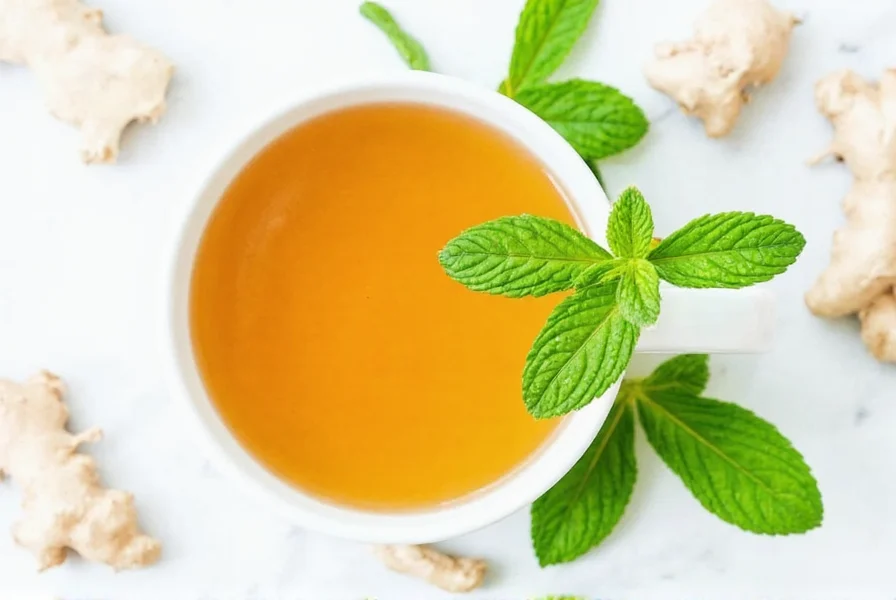What Exactly Is Ginger Mint Tea?
Ginger mint tea represents a harmonious blend of two powerful botanicals: Zingiber officinale (ginger) and Mentha species (typically spearmint or peppermint). Unlike traditional black or green teas, this herbal infusion contains no tea leaves and is naturally caffeine-free. The preparation involves steeping fresh or dried ginger root with mint leaves in hot water, creating a beverage with distinctive spicy and cooling notes.
Historically, both components have been used across various cultures for centuries. Ancient Chinese and Ayurvedic medicine practitioners utilized ginger for digestive issues, while mint appears in Egyptian medical texts dating back to 1550 BCE. The combination creates a synergistic effect that enhances the individual benefits of each herb, making ginger mint tea for digestion particularly effective.

Science-Backed Health Benefits of Ginger Mint Tea
Modern research validates many traditional uses of this herbal combination. A 2022 meta-analysis published in Complementary Therapies in Medicine confirmed ginger's effectiveness in reducing nausea, particularly for pregnancy-related morning sickness and chemotherapy-induced nausea. The study noted that doses of 1-1.5 grams of ginger daily provided significant relief.
| Benefit | Scientific Support | Recommended Consumption |
|---|---|---|
| Digestive Support | Multiple studies show ginger accelerates gastric emptying | 8-16 oz before or after meals |
| Nausea Relief | Strong evidence for pregnancy and motion sickness | 4-8 oz at first symptom onset |
| Anti-Inflammatory Effects | Gingerols reduce inflammatory markers in clinical trials | 12-24 oz daily for chronic issues |
| Antioxidant Properties | Mint provides rosmarinic acid; ginger offers gingerols | Regular moderate consumption |
How Ginger and Mint Work Together
The magic of ginger mint herbal tea benefits lies in their complementary mechanisms. Ginger contains gingerols and shogaols that stimulate digestive enzymes and relax intestinal muscles, while mint's menthol activates cold-sensitive receptors that calm stomach spasms. This dual-action approach makes the combination particularly effective for:
- Irritable bowel syndrome (IBS) symptom management
- Post-operative nausea reduction
- Morning sickness during pregnancy
- Digestive discomfort after heavy meals
A 2021 clinical trial in the Journal of Gastroenterology found participants with functional dyspepsia experienced 40% greater symptom relief with ginger-mint combination versus either herb alone. The researchers attributed this to the complementary pathways each herb uses to support digestive health.
Preparing the Perfect Cup of Ginger Mint Tea
While commercial tea bags offer convenience, preparing fresh ginger mint tea at home maximizes therapeutic compounds. Follow this evidence-based method:
- Peel and thinly slice 1 inch of fresh ginger root (increases surface area for extraction)
- Crush 8-10 fresh mint leaves to release essential oils
- Bring 8 ounces of filtered water to just below boiling (195°F/90°C)
- Pour water over ingredients and steep covered for 8-12 minutes
- Strain and enjoy plain or with a squeeze of lemon (avoid honey to maintain low sugar content)
For enhanced ginger mint tea for nausea relief, add the mint during the last 3 minutes of steeping to preserve volatile menthol compounds. Longer ginger steeping (up to 15 minutes) increases gingerol extraction for stronger anti-inflammatory effects.

Safety Considerations and Potential Interactions
Ginger mint tea remains safe for most people when consumed in moderation (1-3 cups daily). However, certain populations should exercise caution:
- Blood thinning medications: Ginger may enhance effects of warfarin and other anticoagulants
- Gallstone conditions: Ginger stimulates bile production which could trigger attacks
- Acid reflux: Mint may relax lower esophageal sphincter in sensitive individuals
- Pregnancy: While generally safe for nausea, consult your provider about daily limits
A 2023 review in Phytotherapy Research noted no significant adverse effects at moderate consumption levels but recommended consulting healthcare providers for those with chronic conditions or taking prescription medications. The study established 4 grams of ginger daily as the upper safety threshold for most adults.
Ginger Mint Tea vs. Other Herbal Remedies
When comparing ginger mint tea versus plain ginger tea, the combination offers distinct advantages for digestive issues. While pure ginger tea provides stronger anti-nausea effects, the mint addition:
- Reduces the intense spiciness that some find unpleasant
- Adds additional antispasmodic properties for cramping relief
- Creates a more balanced flavor profile encouraging consistent consumption
- Provides complementary antioxidant compounds
For those seeking ginger mint tea alternatives for digestion, consider fennel or chamomile blends. However, these lack ginger's potent anti-nausea compounds. The unique dual-action approach of ginger and mint makes this combination particularly valuable for comprehensive digestive support.
Practical Applications in Daily Wellness
Incorporating ginger mint tea into your routine requires minimal effort but delivers maximum benefit when timed strategically:
- Morning routine: 8 oz upon waking supports digestion throughout the day
- Pre-meal: 4-6 oz 20 minutes before eating prepares digestive system
- Post-meal: 6-8 oz after heavy meals prevents discomfort
- Travel companion: Keep ready for motion sickness prevention
For those exploring ginger mint tea for weight management, note that while it may support metabolism slightly, its primary value lies in reducing bloating and improving digestion rather than direct fat burning. The hydration and reduced inflammation may indirectly support healthy weight management when combined with proper diet and exercise.
Conclusion: Maximizing Your Ginger Mint Tea Experience
Ginger mint tea represents a time-tested herbal remedy with growing scientific validation for digestive health and nausea relief. By understanding the evidence-based benefits, proper preparation methods, and appropriate consumption patterns, you can harness this simple beverage for meaningful wellness support. Remember that consistent moderate consumption delivers better results than occasional large doses, and always consult healthcare providers when managing specific medical conditions.
Frequently Asked Questions
How much ginger mint tea can I safely drink daily?
Most adults can safely consume 1-3 cups (8-24 ounces) of ginger mint tea daily. Research suggests not exceeding 4 grams of ginger root daily. Those with medical conditions or taking medications should consult their healthcare provider for personalized recommendations.
Does ginger mint tea help with bloating and gas?
Yes, ginger mint tea effectively reduces bloating and gas through multiple mechanisms. Ginger stimulates digestive enzymes and gastric motility, while mint relaxes intestinal muscles and reduces spasms. Clinical studies show significant improvement in IBS-related bloating within 30-60 minutes of consumption.
Can I drink ginger mint tea while pregnant?
Ginger mint tea is generally considered safe during pregnancy for nausea relief, with most studies supporting up to 1 gram of ginger daily. However, pregnant women should consult their healthcare provider before regular consumption, especially during the first trimester. Some providers recommend avoiding large quantities late in pregnancy due to theoretical concerns about uterine stimulation.
What's the best time to drink ginger mint tea for digestion?
For optimal digestive benefits, drink ginger mint tea 20 minutes before meals to prepare your digestive system, or immediately after meals to support digestion. For general wellness, morning consumption helps establish a healthy digestive rhythm for the day. Those with specific digestive conditions may benefit from consistent daily consumption at regular intervals.











 浙公网安备
33010002000092号
浙公网安备
33010002000092号 浙B2-20120091-4
浙B2-20120091-4